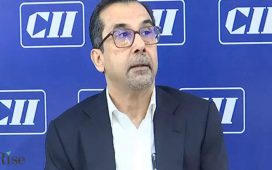Unlock the Editor’s Digest for free
Roula Khalaf, Editor of the FT, selects her favourite stories in this weekly newsletter.
Marks and Spencer co-chief executive Katie Bickerstaffe is stepping down after less than two years in the role, leaving Stuart Machin as the sole boss of the UK retailer.
She will leave after the company’s annual shareholder meeting in July to pursue other board roles, M&S said on Thursday, having helped revive the retailer’s fortunes over the past 24 months.
Bickerstaffe and Machin were promoted from joint chief operating officers by chair Archie Norman after former boss Steve Rowe announced plans to quit.
Bickerstaffe has been leading the digital, data and technology aspects of the business since 2022 and reports to Machin, who runs the business day-to-day. In January, the retailer said Rachel Higham would be joining M&S from WPP in the new financial year as chief digital and technology officer, reporting to Machin.
“I’m very grateful to Katie for her support in seeing M&S through this important period in the reshaping of the business. We now have a much stronger business, and she will move on with our very best wishes,” Machin said in a statement on Thursday.
Bickerstaffe is a non-executive on the England and Wales Cricket Board and the housebuilder Barratt Developments. She was previously executive chair of SSE Energy Services and ran the UK and Ireland business of Dixons Carphone.
At the time when she and Machin were appointed co-CEOs, Nick Bubb, an independent retail analyst, described the move to appoint co-chief executives “not just a fudge, but an M&S fudge”.
Norman subsequently defended the decision, saying the retailer was too complex to be run by one “Napoleonic” leader and the company had “a long planned succession”.
“The co-CEO structure is always a difficult one to maintain as it presents the risk of a power struggle,” said Russ Mould, investment director at AJ Bell.
“Although Katie had the title of co-CEO she had no direct reports from the board and reported into the CEO,” said analysts at BNP Paribas. “Overall, I don’t think this news is a massive surprise or share price sensitive. M&S is in the best place it has been for many years operationally and financially.”
Bickerstaffe joined M&S as a non-executive director in 2018 and moved into an executive role in 2020 before becoming co-chief operating officer in 2021. She is the first female boss in M&S’s history.
At the time of her appointment as co-chief executive, M&S said it would pay Bickerstaffe a £750,000 salary for a four-day week, in effect earning almost £140,000 more pro rata than Machin, who was full-time.
A proponent of flexible working, Bickerstaffe has worked four days a week in previous roles. “At some point you look at stuff seven days a week,” she said in an interview. “We’re [M&S] a seven-days-a-week, 24-hour operation and that’s what you do, but [four days] . . . gives me the freedom to spend some downtime with my kids . . . It really matters to me.”








